Opinion: NSSF savings were meant for emergencies like these
By Patrick Murungi Ngasirwa
I have read the thoughts of my learned brother Nimwesiga Seth that appeared under ‘NSSF Savings not a Contingency Fund for Emergencies’ and I would like to offer a response.
Keep Reading
To start with, I agree with him that the National Social Security Fund (NSSF) as it is now was established in 1985. But the Fund is way older than that, as he rightly stated it was established by the 1967 Social Security Fund Act. What we should however interest ourselves in at this point are the principal reasons for its formation. In September 1963, the Government of Uganda then solicited for the services of a one Mr. E Turner from the British Ministry of Pensions and National Insurance. He was instructed to conduct a study on the feasibility of a national security scheme. His specific terms of reference were to explore the sustainability of a scheme that would first of all minimize the expenses on government employees and secondly find out a scheme that would cover for contingencies such as sickness and unemployment. The NSSF that we have now is grounded on that foundation and I will show you later why it is important.
I disagree with Seth majorly on three fronts. First, that employees should not bother the NSSF now since it is more concerned about their welfare at an old age (he says when their backs are bent). Secondly, that demanding for savings at this moment is not worth it since it would increase the risk of living a poor life at your retirement. And the third front is that people should rethink their saving culture and avoid such desperate moves.
For starters, the NSSF as it is now provides five benefits. The age benefit which comes at the retirement age of 55, the withdrawal benefit for those who are 50 years and not employed for at least one year, the invalidity benefit which comes with permanent disability, the emigration benefit where the worker leaves the country permanently and the survivor’s benefit which is for the employee’s family upon death. I will agree that the current law doesn’t make provision for an emergency like we are in now but that in itself doesn’t take away the necessity.
On the first premise that Seth makes, where he argues that we should not bother a fund that is more concerned about the employee’s welfare at an old age, I will offer the following argument. Social security as it is has never been about old age alone. Right from the terms of reference that were given to Turner when the Social Security Fund was being set up for the first time in 1963. He was meant to explore possibilities of helping give people cushion in cases such as unemployment and true to that, the Covid pandemic has already created that situation. But also most important is the conception of social security by the International Labour Organisation which defines it as the protection that a society provides to individuals and households to ensure access to health care and to guarantee income security, particularly in cases of old age, unemployment, sickness, invalidity, work injury, maternity or loss of a breadwinner. It is evident from current trends that there will be massive unemployment because many employers are considering or have already started laying off. It is the employees’ money at the NSSF that should come in handy to save them from a looming crisis. We should also agree that Uganda is not as rich as countries like the United States of America and it would be foolhardy to make a comparison between the two. However, for purposes of context we could look at the fact that the USA recently passed a $2 Trillion stimulus through the Coronavirus Aid, relief, and Economic Security Act package that is going to benefit majorly individuals who have social security numbers. These are going to receive one time payments that will be wired directly to their accounts to help them in this difficult period. Uganda doesn’t have the luxury of doing such and that is why the workers are clamoring for part of their NSSF savings which would be an equivalent of a stimulus.
On the second contention that demanding for money at this point would risk one’s retirement, I disagree and here is why. The workers are not demanding for the withdrawal of all their savings; they only want a small percentage which could be in the region of about 20% or 30%. This doesn’t make up even half of their savings and would in no way jeopardize their retirement. But again if we looked at it in a more logical way, would it be possible for someone to reach retirement if they are unable to see the next day? Certainly not and for you to worry about their 60s when they are struggling to see tomorrow is exactly where the point is. It is not every day that workers would stand and demand for their money. They have trusted the scheme with their money for ages and this is only the first time they are coming out in a unison cry to let them access a percentage of their money. We are living in unprecedented times and our decisions should be informed by that!
The third argument made by Seth, that people should be able to rethink their saving culture to avoid such desperate moves is a straight slap in the face of workers who toil day and night to eke a living. Majority of the people in Uganda earn a very modest salary and after the various deductions, they are left with only crumbs for themselves. They struggle to sustain themselves and their families in an ailing economy that has no clutches to hold onto. If we all agree that the NSSF is a saving fund, then why do we prevent workers from benefitting from their savings when they need them most? It would be like going to bed on a hungry stomach with a box full of coins that you fear to break.
In our language, we have a proverb that says, ‘it is what you have in the house that saves you from famine’. The NSSF savings were never made only for old age or retirement, they were also made for times like these.

















